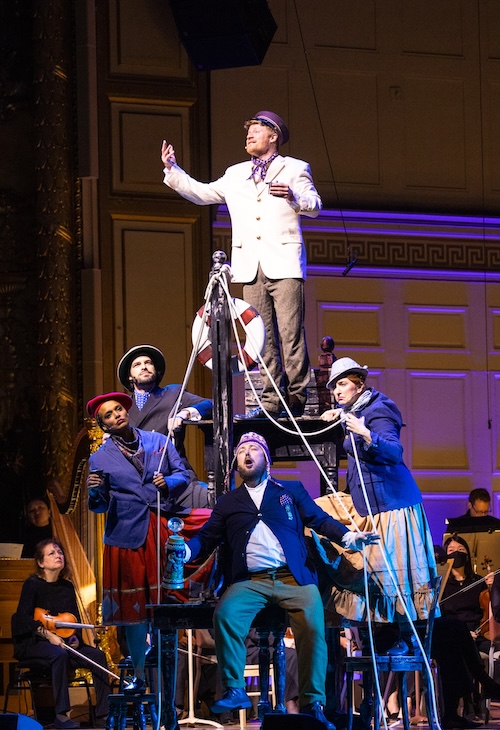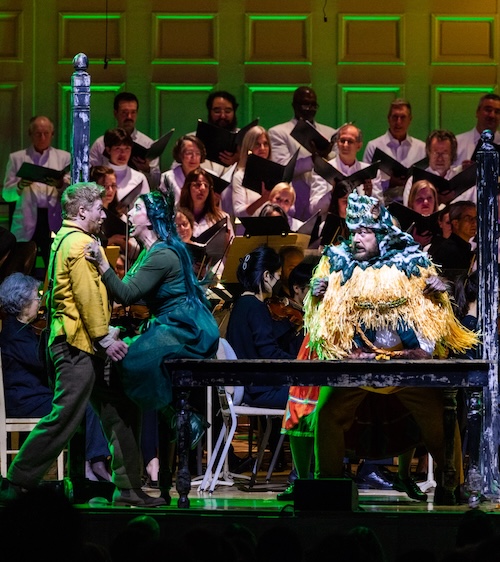Boston Symphony revives a vivid theatrical night with Ibsen’s “Peer Gynt”

The yacht scene from Ibsen’s Peer Gynt performed with music of Edvard Grieg by the Boston Symphony Orchestra Thursday night. Photo: Robert Torres
Sometimes a change of pace is a good thing. Take the second program of the Boston Symphony Orchestra’s two-week long “Music of the Midnight Sun” festival, which was unveiled Thursday night.
Instead of following the usual concert-program path, the ensemble, led by Dima Slobodeniouk and joined by the Tanglewood Festival Chorus, took a detour into the land of theater. Considering the merits of the evening’s offering, one wouldn’t mind them doing this sort of thing more often.
The concert’s single selection was a reprise of Bill Barclay’s BSO-commissioned adaptation of Henrik Ibsen’s Peer Gynt featuring Edvard Grieg’s incidental music. First presented at Symphony Hall in 2017, the update condenses four of the original’s five acts into an eighty-minute-long tetralogy.
Though miniaturized, the essentials of Ibsen’s scopic tale remain intact. Spanning continents and decades, the narrative follows its whimsical title character through his travels, adventures, near-death experiences, close escapes, frauds, seductions, and the like.
Across all of them, Gynt remains true to himself: Camus’ observation that “to be happy, we must not be too concerned with others” may as well be his motto. Only at the end of Gynt’s days does the wanderer come to realize that hedonism, selfishness, and untrammeled individualism are poor substitutes for love, comradeship, and investment in the lives of others.
While Barclay included contemporary references and jokes in his translation, he maintained the spirit of Ibsen’s original rhythms and rhyme schemes. Periodically, this makes for awkward turns of phrase, though Thursday’s cast navigated them efficiently.
Caleb Mayo was a carefree, energetic Gynt, playing up the physicality of the role if not exactly growing in depth by the time of his closing speech. As his mother, Åse, Bobbie Steinbach tolerated her son’s hijinks with a knowing wink or two; her death scene was conspicuously touching.

Caleb Mayo (left) in the title role, with Caroline Lawton as the Woman in Green, and Risher Reddick as the Mountain King in Peer Gynt. Photo: Robert Torres
In other roles, Robert Walsh brought welcome gravity to the Button Moulder while Risher Reddick and Caroline Lawton stole Act 2 with their riotous performances as, respectively, the Mountain King and the Woman in Green. Hardanger fiddler Vidar Skrede’s several turns lent the proceedings a dash of authentic Nordic folk spirit.
Barclay’s direction utilized all of the stage extension in front of the hall and put Cristina Todesco’s simple sets of tables, chairs, and boxes, as well as Chip Schoonmaker’s folk costumes, to good use. The production unobtrusively presented the basic atmosphere for each of the play’s various settings while leaving plenty to the imagination.
The musical forces were crowded on the stage behind the action, though that hardly hindered the crispness or vitality of their contributions. Indeed, as Thursday’s performance demonstrated, this incidental music isn’t just a parade of pretty tunes; rather, it shines dramatically and expressively when heard in the proper context.
That Slobodeniouk was on the podium was a special treat. In previous appearances, the Moscow-born conductor has proven himself a master of getting the BSO to play with real subtlety. He managed as much again on Thursday.
Woodwind solos in the Act 1 Prelude unfolded with beguiling warmth while the music accompanying the scenes with the Mountain King was impish and characterful. In “Morning Mood,” Slobodeniouk teased out the delicious chromatic progressions and he drew astonishingly focused fade-outs from the orchestra at the end of both “Åse’s Death” and “Solveig’s Lullaby.”
The last and “Solveig’s Song” were sweetly sung by Georgia Jarman, who floated the high notes of the latter with effortless precision.
Though standing on risers, the Tanglewood Festival Chorus periodically struggled to be heard above the BSO. But when the group had the floor to themselves, as they did during Act 5’s a cappella Pentecost hymn, what emerged was indisputably glorious: noble, richly blended, resonant choral singing that was fully worthy of the music and its redemptive, eye-opening role at that moment in the drama.
The program will be repeated at 1:30 p.m. Friday and 8 p.m. Saturday at Symphony Hall. bso.org
Posted in Performances